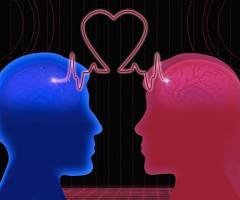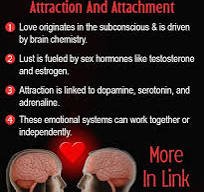
Falling in love triggers a powerful neurochemical cascade, flooding the brain with dopamine (euphoria), oxytocin (bonding), and noradrenaline, activating the reward system, reducing judgment (prefrontal cortex), and causing physical symptoms like a racing heart, creating an addictive-like state of passion and obsessive focus. As love matures, stress hormones like cortisol decrease, shifting from intense craving to calmer attachment, though the reward pathways remain active, fostering long-term connection and security.
Brain & Body Transformations
- Euphoria & Reward: Dopamine surges, creating intense pleasure and motivation, similar to addictive substances, while noradrenaline causes excitement, sweaty palms, and a racing heart.
- Obsession: Serotonin levels drop, leading to obsessive thoughts about the new partner, much like in obsessive-compulsive disorders.
- Bonding & Trust: Oxytocin (released during touch) and vasopressin foster deep attachment, trust, and intimacy, solidifying the relationship.
- Impaired Judgment: The prefrontal cortex, responsible for critical thinking, shows reduced activity, making you overlook flaws and act impulsively.
- Stress Response: Cortisol levels rise initially, creating “love stress” with physical symptoms, but eventually normalize, turning love into a stress buffer.
Stages of Love
- Lust/Attraction (Early Stage): Dominated by dopamine, noradrenaline, and lower serotonin, causing euphoria, energy, focus, and obsessive tendencies.
- Attachment (Long-Term): Oxytocin and vasopressin become key, promoting calm, security, and lasting bonding as the intense stress fades.
Discover how the incredible chemical reactions and brain activities that occur when we fall in love impact everything from our emotions to our physical health, and even our behavior.
The Phenomenon of Love: More Than Just a Feeling

Love is often depicted as a mystical, almost magical experience that sweeps us off our feet. In reality, love is far more than just an emotional high. Falling in love activates a series of fascinating physiological processes in the brain and body, creating a complex, yet beautiful transformation. While we may feel overwhelmed with emotions and fluttering hearts when we meet someone special, love triggers something far deeper, affecting both our brain chemistry and overall well-being.
When we fall in love, our brains are bombarded with a powerful cocktail of chemicals. This sudden shift not only creates the giddy, euphoric sensation we associate with love but also affects our thoughts, behaviors, and even our physical health. The changes are so profound that they can shape the way we act, feel, and interact with the world around us.
The Brain on Love: Chemicals at Play
One of the first things that happens when you fall in love is the release of dopamine, the “feel-good” neurotransmitter. Dopamine is responsible for feelings of pleasure, reward, and motivation. It creates that intense rush of joy when you see or think about your partner, making everything feel more exciting and meaningful. This chemical flood is similar to the sensation you get from other pleasurable experiences, such as eating your favorite food or winning a prize.
Another key player in the love process is oxytocin, known as the “bonding hormone.” Often released during physical closeness, oxytocin plays a crucial role in forming emotional connections. This is why holding hands, hugging, or cuddling your partner can make you feel deeply connected and secure. Oxytocin promotes trust and empathy, strengthening the bond between two people in love.
Serotonin, which regulates mood and feelings of happiness, also plays an important role. When you’re in love, your serotonin levels may fluctuate, sometimes causing obsessive thoughts about your partner or an overwhelming sense of happiness. In fact, studies show that the early stages of love can mirror the symptoms of obsessive-compulsive disorder (OCD), making your brain intensely focused on your partner.
The Heart’s Response: More Than Just Butterflies
We’ve all felt it – that nervous flutter in our stomachs or the racing heart when we’re around someone we’re falling for. This physical reaction is your body’s response to the intense chemical changes in your brain. When you’re in love, your body produces adrenaline, also known as the “fight or flight” hormone. Adrenaline increases your heart rate, makes you feel a rush of excitement, and heightens your alertness.
This bodily response to love is evolutionarily driven. In ancient times, this surge of adrenaline would have helped people stay alert and bond with their partners, ensuring successful reproduction. Today, these same chemical reactions continue to affect our bodies, albeit in a more emotional and psychological sense.
In addition to adrenaline, your body also produces cortisol, the stress hormone. In small amounts, cortisol helps you stay alert and energized when you’re with your partner, making you feel like you’re walking on air. However, excessive cortisol levels due to stress or anxiety can sometimes lead to feelings of insecurity or jealousy.
The Effects on the Body: From Stress to Relaxation
While love can sometimes cause your body to experience stress responses (like racing hearts or sweaty palms), it also has a remarkable ability to calm and soothe. As oxytocin levels rise, feelings of anxiety or stress can decrease. Oxytocin promotes a sense of relaxation and trust, which can counteract the effects of cortisol, reducing stress and creating a sense of emotional and physical well-being.
Interestingly, love also boosts your immune system. Studies have shown that when people are in loving, supportive relationships, their immune function tends to be stronger, which helps ward off illness. The feeling of safety and comfort that comes from being in love has tangible, physical benefits, from reducing the risk of heart disease to improving overall health.
Love and Behavior: The Power of Connection As love alters your brain chemistry and physiological responses, it also shapes your behavior. One of the most notable changes is the way we act toward others. When we’re in love, we tend to become more empathetic, selfless, and giving. The brain’s reward system becomes more attuned to our partner’s needs, making us more likely to engage in acts of kindness or support.
This increase in empathy is driven by the release of oxytocin, which fosters compassion and care. In romantic relationships, this leads to more thoughtful gestures, deeper conversations, and a stronger desire to nurture the relationship. Love makes us feel more connected to others, and this deep connection compels us to act in ways that strengthen our bond.
Additionally, falling in love can make us more resilient. Studies have shown that people in loving relationships are better equipped to cope with stress and adversity. The emotional support provided by a partner can help buffer against life’s challenges, promoting a sense of security and stability.
The Evolutionary Purpose of Love
From an evolutionary perspective, love serves a critical function. It encourages bonding between partners, facilitating cooperation, reproduction, and the raising of offspring. Love drives humans to connect and form long-lasting relationships, creating a stable environment in which children can be raised.
The chemicals involved in love—dopamine, oxytocin, and serotonin—are part of a larger survival mechanism that ensures the continuation of the human species. Without love, human human beings would have little incentive to connect, mate, and form families. In this sense, love isn’t just about emotional satisfaction; it is integral to our evolutionary survival.
Conclusion: Love’s Profound Impact
Falling in love isn’t just a fleeting emotional experience—it’s a profound transformation that affects both your brain and body in complex, long-lasting ways. From the release of dopamine and oxytocin to the racing heart and physical relaxation, love touches every part of us, creating a deep, meaningful connection between partners. As we fall in love, we become more empathetic, more connected, and more resilient, enhancing not only our emotional lives but our physical health too.
Understanding the science behind love helps us appreciate the profound impact it has on our lives. It’s a reminder that love is not just something we feel—it’s something we experience deeply, physically, and psychologically. So, the next time you feel those butterflies in your stomach, remember that it’s not just an emotional reaction—it’s your brain and body working together to create something truly magical.
Q&A: Your Questions About the Science of Love
Q: Why do we feel so “high” when we first fall in love?
A: When you first fall in love, your brain releases dopamine, which triggers feelings of excitement, happiness, and pleasure.This creates the euphoric sensation we often associate with the early stages of romance.
Q: Can love really affect our physical health?
A: Yes, it can! Love boosts your immune system, lowers stress levels, and promotes heart health. The emotional connection and support from a partner can lead to better overall physical health.
Q: Why do we sometimes feel anxious or jealous when we’re in love?
A: Love can trigger a mix of emotions. When we feel insecure or anxious, cortisol (the stress hormone) is released. These feelings are normal but can be mitigated by open communication and trust in the relationship.
Q: Does love make us act differently than we normally would?
A: Yes, love often increases empathy, compassion, and selflessness. When in love, people tend to prioritize their partner’s needs and demonstrate kindness and care, enhancing the relationship and emotional connection.
Q: How does love influence our decision-making and behavior?
A: Love can impact decision-making by prioritizing the needs of your partner and the relationship. The emotional bond formed through love strengthens our desire to support and protect each other, influencing our actions.
